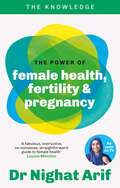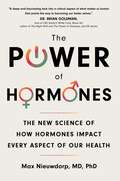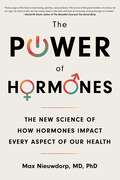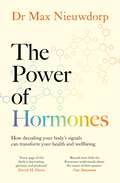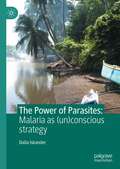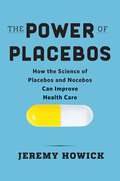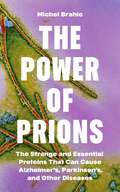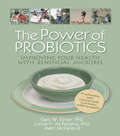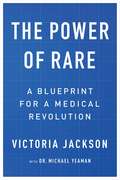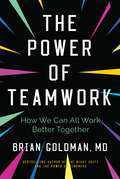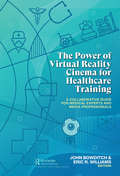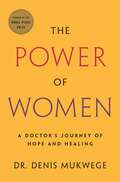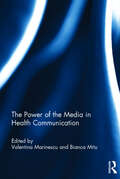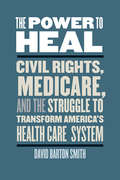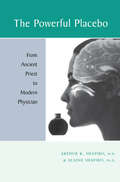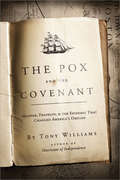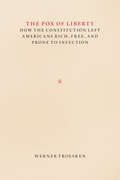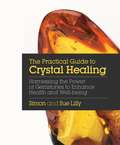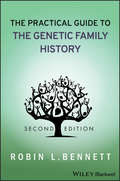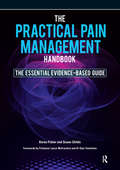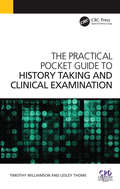- Table View
- List View
The Power of Female Health, Fertility & Pregnancy: The pocket guide to female health from one of TV's best loved doctors (The Knowledge)
by Dr Nighat ArifITV This Morning's GP Dr Nighat Arif brings you the essential guide to female health from puberty to menopause.This book tackles important topics including:- Planning for pregnancy, including specific advice for LGBTQ+ parents- How pregnancy affects your body and complications to know about- Facing infertility and your options, including medicine to improve fertility and assisted conception- Health concerns including endometriosis, polycystic ovary syndrome and gynaecological cancersThe Power of Female Health, Fertility & Pregnancy encompasses all experiences, including the perspectives of women of colour, people of all cultures, and the transgender community to ensure that all groups affected by female health concerns are a part of vital conversations.For all women and people assigned female at birth, whether you are navigating your pregnancy journey or exploring your symptoms and wondering what to check, when, this book covers everything you need to know.Content from this book previously appeared in the hardback edition of The Knowledge: Your Guide to Female Health from Menstruation to the Menopause
The Power of Female Health, Fertility & Pregnancy: The pocket guide to female health from one of TV's best loved doctors (The Knowledge)
by Dr Nighat ArifITV This Morning's GP Dr Nighat Arif brings you the essential guide to female health from puberty to menopause.This book tackles important topics including:- Planning for pregnancy, including specific advice for LGBTQ+ parents- How pregnancy affects your body and complications to know about- Facing infertility and your options, including medicine to improve fertility and assisted conception- Health concerns including endometriosis, polycystic ovary syndrome and gynaecological cancersThe Power of Female Health, Fertility & Pregnancy encompasses all experiences, including the perspectives of women of colour, people of all cultures, and the transgender community to ensure that all groups affected by female health concerns are a part of vital conversations.For all women and people assigned female at birth, whether you are navigating your pregnancy journey or exploring your symptoms and wondering what to check, when, this book covers everything you need to know.Content from this book previously appeared in the hardback edition of The Knowledge: Your Guide to Female Health from Menstruation to the Menopause
The Power of Hormones: The New Science of How Hormones Impact Every Aspect of Our Health
by Max NieuwdorpA fascinating, in-depth look at the crucial role that hormones play on human health at all ages and stages of our lives—written by one of the world&’s foremost experts.&“Hormones are the conductors of our body&’s orchestra.&” —Max Nieuwdorp Our hormones shape us at every stage of our lives, from the second we are conceived to the moment we breathe our last breath. They are essential to our immune system, sleep, digestion, hunger, stress levels, and so much more. When our hormone systems aren&’t functioning well, it wreaks havoc on our health and our wellbeing—and yet most of us know very little about the far-reaching power of the human body&’s crucial chemical messengers. Professor Max Nieuwdorp, an international authority on hormones, sets out to change this. He explores the role our hormones play from our early years through to puberty, pregnancy, and old age, combining stories from his day-to-day life treating his patients with the amazing, cutting-edge new science of hormones. These discoveries are changing the way that we understand our bodies, from the decline in male hormones during andropause to the new science on how gut bacteria affects our hormone balance. This eye-opening, myth-busting book shines a light on the incredible and under-explored role of hormones, which are essential not only to our health, but to our moods, our social interactions, and so much of what makes us who we are.
The Power of Hormones: The New Science of How Hormones Impact Every Aspect of Our Health
by Max NieuwdorpDecode the subtle signals of hormones with this foundational book from expert endocrinologist and leading researcher in the field. Hormones rule our lives. From conception, to birth, to our last breath, hormones control the delicate processes that keep our bodies in balance. However, when this careful stasis is disturbed, our hormones can wreak havoc on our health. Max Nieuwdorp, MD, PhD, knows exactly what signals your hormones are sending you and how they impact how you look, feel, and behave. In this foundational guide to hormonal health, he breaks down how hormones impact every system in the body, empowering you with the knowledge you need to get to the root of chronic health problems and set yourself up long lasting, sustainable wellness. Inspired by Dr. Nieuwdorp&’s day-to-day interaction with his patients, The Power of Hormones describes hormonal health in a detailed and accessible style, helping you clue in to symptoms of hormonal imbalance such as persistent fatigue and weight gain. His unique approach advocates for considering the far-reaching roles played by hormones throughout the body and is a go-to guide for understanding how they influence our health, our lives, and who we are.
The Power of Hormones: The new science of how hormones shape every aspect of our lives
by Max Nieuwdorp'Every page of this book is fascinating, glorious, and profound. This is one of the great frontiers of science for our age'Daniel M. Davis, author of The Beautiful Cure and The Secret Body _____________________________________________________________From a world-leading hormones specialist, the definitive book on the science of hormones and how understanding the secrets of our body&’s messengers can revolutionise our health and wellbeing Hormones are the messengers that drive every process in our body. They are essential to how we grow, fight disease and digest food; why we struggle to sleep, lose weight and manage stress – and so much more. When our hormones are imbalanced this can wreak havoc on our health, leading to conditions as far reaching as diabetes, infertility and heart disease. They also influence our personalities, how we feel and even the decisions we make. And yet for too long the power of our body&’s messengers has been overlooked. In this vital and myth-busting book, world-leading hormones expert Dr Max Nieuwdorp transforms our understanding of our bodies. Combining stories from his daily life treating his patients with amazing, cutting-edge new science, he reveals the crucial role that hormones play from our early years through to old age, exploring everything from the effect that smartphones have on our sleep and longevity to how our gut bacteria produce &‘happy&’ hormones. As Nieuwdorp reveals, hormones are central to our moods, our relationships and so much of what makes us who we are. Demystifying the signals of our bodies, he explores how we can rebalance our hormones for happier and healthier lives. _________________________________________________________ 'A delightfully readable book . . . A deep and fascinating look into a critical aspect of what makes us human and points the way to becoming our better selves' Dr. Brian Goldman, author of The Night Shift &‘The Power of Hormones reveals how little the Everyman understands about the extent of their power' New Statesman
The Power of Neurodiversity: Unleashing the Advantages of Your Differently Wired Brain (published in hardcover as Neurodiversity)
by Thomas ArmstrongOC Parents, teachers, and policymakers should all read this thought-provoking book. I loved it. OCOOCoTemple Grandin, author of "Thinking in Pictures "
The Power of Parasites: Malaria as (un)conscious strategy
by Dalia IskanderThis book describes how malaria both frustrates and facilitates life for Indigenous Pälawan communities living in the forested foothills of the municipality of Bataraza on the island of Palawan in the Philippines. Tracing the arc of malaria on the archipelago from colonial encounters to the present day, it examines the ways in which malaria parasites have become entangled in contemporary lives. It uniquely explores the experiences of local government leaders working towards sustainably developing this last ecological frontier, health workers trying to meet international targets to eliminate malaria, and Pälawan people trying to keep their bodies, social relations and the cosmos in careful balance. In exquisite detail, Dr Dalia Iskander shows how malaria emerged from, and was intrinsic to, a whole host of strategically-orientated social practices that were enacted in as well as around the disease’s name, as people worked day-to-day to gain power in different guises in different arenas.
The Power of Placebos: How The Science Of Placebos And Nocebos Can Improve Health Care
by Jeremy HowickThe Power of Prions: The Strange and Essential Proteins That Can Cause Alzheimer’s, Parkinson’s, and Other Diseases
by Michel BrahicThe remarkable family of proteins that can make us very ill—but can also be linked to long-term memory, immunity, and the origin of lifeOver the last decade, scientists have discovered the importance and widespread presence in the body of a remarkable family of proteins known as prion proteins. Research links various types of prion proteins to neurodegenerative diseases such as Parkinson&’s and Alzheimer&’s—and this has fueled the search for new drugs that could halt the progression of these terrible disorders. Other discoveries have revealed the essential roles prion proteins play in memory and immunity, and—in an extraordinary finding—the part they may have played in the beginnings of life on our planet. In this engaging and accessible book, Michel Brahic tells the story of these amazing and versatile proteins.Brahic, a leading researcher on diseases of the central nervous system, first describes the discovery of prions and their role in infection, beginning with early work on the animal disease scrapie and a mysterious human illness in New Guinea, apparently transmitted by cannibalism. Prions were eventually identified and named by Stanley Prusiner in the 1980s. (Brahic tells us Prusiner&’s alternate name for prion was &“piaf.&”) Prion proteins were then revealed as the cause of other illnesses, from &“mad cow&” disease and its human counterpart, Creutzfeldt-Jakob disease, to such noninfectious brain disorders as Parkinson&’s and Alzheimer&’s. While the prion proteins responsible for diseases are definitively &“bad,&” Brahic also explains that these abnormal prions are rare exceptions. Most of the time, prion proteins actually serve &“good&” and vital functions—and they may even have been present at the origin of life itself.
The Power of Probiotics: Improving Your Health with Beneficial Microbes
by Gary W. Elmer Lynne V Mcfarland Marc Mcfarland Ethan B RussoGet information you can trust to make the right decisions about probioticsThe Power of Probiotics is a consumer-friendly guide to the selection and use of probiotics that have been proven effective in the prevention and treatment of human diseases. This jargon-free reference resource provides practical advice on how and when to use probiotics and how to select the best commercially available products, based on usefulness, quality, and safety, to lower the risk of disease and maintain a positive health image. The book offers objective information on evaluating product claims, making sense of regulations and labeling, and sorting through manufacturing and marketing issues.The Power of Probiotics presents an expert review of the scientific evidence for probiotics, illustrated with summary tables and diagrams for quick reference. Each chapter starts with a series of FAQs with clear and concise answers before moving into more in-depth analysis from the book&’s authors, who combine more than 20 years of research from the patient clinic and the bench laboratory with extensive experience in writing and translating medical articles for consumer-oriented publications. This unique book presents definitions and descriptions of probiotics and a history of their uses, a review of medical conditions prevented and/or treated by probiotics, available products (with brand names), uses with other medications, and risks and side effects. The Power of Probiotics examines the treatment and/or prevention of: allergies cancer colds and flu constipation dental health diarrhea high cholesterol indigestion inflammatory bowel diseases pseudomembranous colitis stomach ulcers stress urinary tract infections vaginal infections weight loss and much more!The Power of Probiotics is an essential resource for health-conscious consumers who are interested in natural alternatives to conventional medicines. Health professionals, educators, and students will also benefit from the book&’s extensive references.
The Power of Rare: A Blueprint for a Medical Revolution
by Victoria Jackson Dr Michael Yeaman"The Power of Rare is equal parts science and inspiration. In her urgent drive to help her daughter, Victoria Jackson not only transformed the competitive world of biomedical research, but also created a new medical model for generations to come." —Arianna HuffingtonVictoria Jackson revolutionized the beauty industry in the 1980s and '90s with her "no make-up" approach to make-up and ultimately made Victoria Jackson Cosmetics into a billion-dollar global brand. But her greatest test of the power of rare didn't come until her daughter, Ali, was diagnosed with neuromyelitis optica, or NMO—a rare, life-threatening autoimmune disease—and Victoria, driven by a mother's love, set out to find a cure for her daughter. Within days of hearing Ali's diagnosis in 2008, Victoria began the Guthy-Jackson Charitable Foundation to fund medical research into this often misdiagnosed orphan disease. Her "blueprint" called for breaking down the so-called silos of traditional medical research and bringing together some of the greatest minds to collaborate and share their findings. She hadn't expected to galvanize how medical research works, but within only a few years, that's just what she did. By focusing on the "rare" in each of us, the foundation has catalyzed breakthroughs in NMO in record time. These advances are also opening new doors to solving MS, lupus, and other autoimmune diseases—plus diseases that are not so rare, including cancer, infection, aging, and more. It has been Victoria's guiding philosophy that if she can do it, anyone can. With The Power of Rare, she shares how the foundation harnessed the power of rare to speed discoveries that help patients. Through her business savvy, wit, and heart, she offers real-world advice and inspiration for others to tap into "rare" to empower their own breakthroughs.
The Power of Teamwork: How We Can All Work Better Together
by Dr. Brian GoldmanNew from the bestselling author of The Power Kindness and host of CBC Radio’s White Coat, Black ArtIn the high-pressure and complex setting of healthcare, a new approach to teamwork is leading to healthier patients, happier staff and more efficient operations. Healthcare’s embrace of a new teamwork model has been noticed by people outside the medical world, so doctors are going outside the walls of the hospital to teach manufacturers, business owners, franchisees, customer service representatives and even those in sports and entertainment to do better by shifting the culture from “me” to “we.” Drawing on groundbreaking research and examples from around the world, The Power of Teamwork shows how a team approach to medicine can improve customer service and help women break the glass ceiling. It can solidify the provision of social services to troubled youth, and boost the efficiency and safety of the military and critical industrial complexes like nuclear power plants. It can even make professional sports teams perform better.
The Power of Virtual Reality Cinema for Healthcare Training: A Collaborative Guide for Medical Experts and Media Professionals
by Bob Fine Eric R. Williams John Bowditch Adonis DuradoCinematic Virtual Reality brings a combination of documentary, narrative and game design principles to the medical profession and, in the healthcare arena, collaboration is a key component for creating intellectually- and emotionally- rich immersive experiences. "The Power of Virtual Reality Cinema for Healthcare Training" gathers more than a dozen experts from both the production and healthcare fields to break down best practices for creating successful cine-VR projects. Designed for multi-disciplinary teams interested in integrating cine-VR production into their healthcare training and educational programs, this book has been written for two audiences: the healthcare professional interested in what production experts consider when approaching a project, and the media expert curious about how this new technology can be used in the medical field. Highlights include: Cutting edge medical education techniques developed by Ohio University’s GRID Lab, including: PREality (creating a forced sense of deja-vu to increase acclimation time), a unique approach to eye-tracking to enhance team performance, and the low-CRIS technique (a low-cost rapid implementation strategy to capture patient care for rapid graduate student training). Insightful production techniques that will enhance your cine-VR projects including advanced plating methods to hide lighting set-ups, immersive audio considerations, and new ways to consider 360 storytelling including the Lovrick montage and the Christmas Carol continuum for story development. Detailed explanations of the production considerations and results of specific cine-VR productions (from funding approaches to distribution) including access to more than five hours of cine-VR examples of the actual productions available for download. Details on a wide variety of medical cine-VR projects, including 100 images that illustrate best practices for topics such as recording in active medical facilities, building successful multi-disciplinary teams, working within HIPAA regulations, conceptualizing cine-VR libraries for graduate education, and implementing innovative distribution models.
The Power of Women: A Doctor's Journey of Hope and Healing
by Denis MukwegeFrom Nobel laureate, world-renowned doctor, and noted human rights activist Dr. Denis Mukwege comes an inspiring clarion call-to-action to confront the scourge of sexual violence and better learn from women's resilience, strength, and power.At the heart of Dr. Mukwege’s message will be the voices of the many women he has worked with over the years. Dr. Mukwege will use individual cases to reassure all survivors that, even if their psychological wounds may never fully heal, they can recover and thrive with the right care and support.Dr. Mukwege’s dramatic personal story is interwoven throughout as he explores the bigger issues that have become a focus of his advocacy. He will seek to explain why sexual violence is so often overlooked during war, and how governments need to recognize and compensate victims. He will also stress the importance of breaking down the taboos surrounding assault, and the necessity of building a system that supports women who come forward.His words advocate for saying ‘no’ to indifference and he asks readers to reckon with the West’s involvement in perpetuating sexual violence in places like the Democratic Republic of Congo, and to confront the abuse taking place in their own communities.Sexual violence does not occur in a vacuum. The conflict in the Democratic Republic of Congo, which has raged for over 20 years and has claimed an estimated 5 million lives, is inseparable from Western patriarchy and economic colonization. And this cycle of violence and spoils is not limited to Congo. Dr. Mukwege’s work has led him to South Korea, Latin America, the Middle East, and elsewhere in Africa, where he has found striking similarities in women’s testimonies.The truth is, through the intricate ties of the global economy, we are all implicated in violence against women – whether it occurs amidst the fighting in the Democratic Republic of Congo or on college campuses in the West. And Dr. Mukwege’s writing will address men as well, encouraging and guiding them to become allies in the fight against sexual abuse, in war and in peace.Building more inclusive, gender-balanced societies will require developing what he calls “positive masculinity” – a systemic change in male behavior and attitudes towards women. Dr. Mukwege hopes to inspire other men to speak out and join the struggle, rather than leaving women to fight the battle alone. He will also make the case, drawing from his experience and a wealth of research on the topic, that when women are involved as economic and political decision makers, all of society benefits.The Power of Women will illuminate the enduring strength of women in the face of violence and trauma, and give hope for the potential of individuals to turn the tide.
The Power of the Media in Health Communication
by Valentina Marinescu Bianca MituHealth is a contested concept that has been defined in numerous ways. The media is extremely powerful in promoting health beliefs and in creating role models for contemporary people. The ways in which health is defined or understood can have wide-ranging implications and can have an impact on issues such as health promotion or health literacy. Health presentation in the media has a significant social impact because this type of message is important in changing people's beliefs, attitudes and behaviours relating to health and in promoting health-related knowledge among the target audience. The present volume provides an interdisciplinary and multicultural contemporary approach to the controversial link between medicine and media. The authors that have contributed to this volume analyse the media and medicine from different perspectives and different countries (USA, UK, Portugal, Turkey, Taiwan, Mexico, Estonia, Romania), thus offering a re-positioning of the study of media and medicine. The new perspectives offered by this volume will be of interest to any health communication or media studies student or academic since they bring to light new ideas, new methodologies and new results.
The Power to Heal: Civil Rights, Medicare, and the Struggle to Transform America's Health Care System
by David Barton SmithIn less than four months, beginning with a staff of five, an obscure office buried deep within the federal bureaucracy transformed the nation's hospitals from our most racially and economically segregated institutions into our most integrated. These powerful private institutions, which had for a half century selectively served people on the basis of race and wealth, began equally caring for all on the basis of need.The book draws the reader into the struggles of the unsung heroes of the transformation, black medical leaders whose stubborn courage helped shape the larger civil rights movement. They demanded an end to federal subsidization of discrimination in the form of Medicare payments to hospitals that embraced the "separate but equal" creed that shaped American life during the Jim Crow era. Faced with this pressure, the Kennedy and Johnson Administrations tried to play a cautious chess game, but that game led to perhaps the biggest gamble in the history of domestic policy. Leaders secretly recruited volunteer federal employees to serve as inspectors, and an invisible army of hospital workers and civil rights activists to work as agents, making it impossible for hospitals to get Medicare dollars with mere paper compliance. These triumphs did not come without casualties, yet the story offers lessons and hope for realizing this transformational dream.
The Power to Heal: Civil Rights, Medicare, and the Struggle to Transform America's Health Care System
by David Barton SmithIn less than four months, beginning with a staff of five, an obscure office buried deep within the federal bureaucracy transformed the nation's hospitals from our most racially and economically segregated institutions into our most integrated. These powerful private institutions, which had for a half century selectively served people on the basis of race and wealth, began equally caring for all on the basis of need. The book draws the reader into the struggles of the unsung heroes of the transformation, black medical leaders whose stubborn courage helped shape the larger civil rights movement. They demanded an end to federal subsidization of discrimination in the form of Medicare payments to hospitals that embraced the "separate but equal" creed that shaped American life during the Jim Crow era. Faced with this pressure, the Kennedy and Johnson Administrations tried to play a cautious chess game, but that game led to perhaps the biggest gamble in the history of domestic policy. Leaders secretly recruited volunteer federal employees to serve as inspectors, and an invisible army of hospital workers and civil rights activists to work as agents, making it impossible for hospitals to get Medicare dollars with mere paper compliance. These triumphs did not come without casualties, yet the story offers lessons and hope for realizing this transformational dream.This book is the recipient of the Norman L. and Roselea J. Goldberg Prize from Vanderbilt University Press for the best book in the area of medicine.
The Powerful Placebo: From Ancient Priest to Modern Physician
by Arthur K. Shapiro Elaine ShapiroRanging from antiquity to modern times, this history of the placebo effect is especially timely in light of renewed interest in the mind-body relationship.Until this century, most medications prescribed by physicians were pharmacologically inert, if not harmful. That is, physicians were prescribing placebos or worse without knowing it. In a sense, then, the history of medical treatment until relatively recently is the history of the placebo effect. Based on the authors' lifelong study and clinical research, this is a comprehensive and scholarly examination of the placebo effect. The authors begin by surveying the use of placebos from antiquity to modern times. They also examine the development, use, and validity of the double-blind, controlled clinical trial. And they present their own study of the placebo effect in more than 1000 patients.Demonstrating both the magnitude and the limitations of the placebo effect, the book helps to clarify knotty issues ranging from the evaluation of therapies to the ethics of conducting controlled studies in which patients are deliberately given placebos. With the renewed interest in the mind-body relationship as well as in the role of placebos in new and alternative medical procedures and therapies, the findings of this book are especially timely.
The Pox Lover: An Activist's Decade in New York and Paris
by Anne-Christine D'Adesky<P>The Pox Lover is a personal history of the turbulent 1990s in New York City and Paris by a pioneering American AIDS journalist, lesbian activist, and daughter of French-Haitian elites. In an account that is by turns searing, hectic, and funny, Anne-christine d'Adesky remembers "the poxed generation" of AIDS—their lives, their battles, and their determination to find love and make art in the heartbreaking years before lifesaving protease drugs arrived. <P>D'Adesky takes us through a fast-changing East Village: squatter protests and civil disobedience lead to all-night drag and art-dance parties, the fun-loving Lesbian Avengers organize dyke marches, and the protest group ACT UP stages public funerals. Traveling as a journalist to Paris, an insomniac d'Adesky trolls the Seine, encountering waves of exiles fleeing violence in the Balkans, Haiti, and Rwanda. <P>As the last of the French Nazis stand trial and the new National Front rises in the polls, d'Adesky digs into her aristocratic family's roots in Vichy France and colonial Haiti. This is a testament with a message for every generation: grab at life and love, connect with others, fight for justice, keep despair at bay, and remember.
The Pox and the Covenant
by Tony WilliamsFor one hundred years, God had held to his promise, and the colonists had as well. When the first Puritans sailed into Massachusetts in the seventeenth century, weak from the ocean journey, they formed a covenant with each other and with God to establish a city on a hill-a commitment to live uncorrupted lives together or all suffer divine wrath for their collective sin. But now, a century later, the arrival of one doomed ship would put this covenant to its greatest test. On April 22, 1721, the HMS Seahorse arrived in Boston from the West Indies, carrying goods, cargo, and, unbeknownst to its crew, a deadly virus. Soon, a smallpox epidemic had broken out in Boston, causing hundreds of deaths and panic across the city. The clergy, including the famed Cotton Mather, turned to their standard form of defense against disease: fasting and prayer. But a new theory was also being offered to the public by the scientific world: inoculation. The fierce debate over the right way to combat the tragedy would become a battle between faith and reason, one that would set the city aflame with rage and riot. The Pox and the Covenant is a story of well known figures such as Cotton Mather, James Franklin, and a young Benjamin Franklin struggling to fight for their cause among death and debate-although not always for the side one would expect. In the end, the incredible results of the epidemic and battle would reshape the colonists' view of their destiny, setting for America a new course, a new covenant, and the first drumbeats of revolution.
The Pox of Liberty: How the Constitution Left Americans Rich, Free, and Prone to Infection
by Werner TroeskenThe United States is among the wealthiest nations in the world. But that wealth hasn't translated to a higher life expectancy, an area where the United States still ranks thirty-eighth--behind Cuba, Chile, Costa Rica, and Greece, among many others. Some fault the absence of universal health care or the persistence of social inequalities. Others blame unhealthy lifestyles. But these emphases on present-day behaviors and policies miss a much more fundamental determinant of societal health: the state. Werner Troesken looks at the history of the United States with a focus on three diseases--smallpox, typhoid fever, and yellow fever--to show how constitutional rules and provisions that promoted individual liberty and economic prosperity also influenced, for good and for bad, the country’s ability to eradicate infectious disease. Ranging from federalism under the Commerce Clause to the Contract Clause and the Fourteenth Amendment, Troesken argues persuasively that many institutions intended to promote desirable political or economic outcomes also hindered the provision of public health. We are unhealthy, in other words, at least in part because our political and legal institutions function well. Offering a compelling new perspective, The Pox of Liberty challenges many traditional claims that infectious diseases are inexorable forces in human history, beyond the control of individual actors or the state, revealing them instead to be the result of public and private choices.
The Practical Guide to Crystal Healing: Harnessing the Power of Gemstones to Enhance Health and Well-being
by Sue Lilly Simon LillyThe ultimate handbook on the use of crystals for healing, with expert guidance on how to achieve results – this is a great addition to every crystal enthusiast’s library and a must-have for beginners.Crystals have been used as a complementary therapy to combat both physical and emotional ailments for centuries; their unique vibrational resonances able to restore balance to the body’s energy systems and enhance spiritual, mental and physical wellbeing.Alongside guidance on the most important crystals to use for specific illnesses and situations, whether it be insomnia, migraines, depression or the upheaval of moving house, crystal therapy experts Simon and Sue Lilly provide practical tips on how to use these precious stones to restore overall health and further spiritual development. Using clear, step-by-step instructions, The Practical Guide to Crystal Healing will teach you how to use crystals to: • heal the body • balance the mind • cope with change • feed the spirit • and live in harmony. Packed with tried-and-tested layouts for healing, guided visualizations and meditations, and an illustrated repertory of key crystals, this is an essential book for beginners and experienced crystal healers alike.
The Practical Guide to the Genetic Family History
by Robin L. BennettHelps you develop and assess pedigrees to make diagnoses, evaluate risk, and counsel patientsThe Second Edition of The Practical Guide to the Genetic Family History not only shows how to take a medical-family history and record a pedigree, but also explains why each bit of information gathered is important. It provides essential support in diagnosing conditions with a genetic component. Moreover, it aids in recommending genetic testing, referring patients for genetic counseling, determining patterns of inheritance, calculating risk of disease, making decisions for medical management and surveillance, and informing and educating patients. Based on the author's twenty-five years as a genetic counselor, the book also helps readers deal with the psychological, social, cultural, and ethical problems that arise in gathering a medical-family history and sharing findings with patients.Featuring a new Foreword by Arno Motulsky, widely recognized as the founder of medical genetics, and completely updated to reflect the most recent findings in genetic medicine, this Second Edition presents the latest information and methods for preparing and assessing a pedigree, including:Value and utility of a thorough medical-family historyDirected questions to ask when developing a medical-family history for specific disease conditionsUse of pedigrees to identify individuals with an increased susceptibility to cancerVerification of family medical informationSpecial considerations when adoptions or gamete donors are involvedEthical issues that may arise in recording a pedigreeThroughout the book, clinical examples based on hypothetical families illustrate key concepts, helping readers understand how real issues present themselves and how they can be resolved.This book will enable all healthcare providers, including physicians, nurses, medical social workers, and physician assistants, as well as genetic counselors, to take full advantage of the pedigree as a primary tool for making a genetic risk assessment and providing counseling for patients and their families.
The Practical Pain Management Handbook: The Essential Evidence-Based Guide
by Dr Keren FisherThe successful management of chronic pain remains an elusive goal. As more complex diagnostic and intervention procedures become available, patients and clinicians alike have ever-greater expectations of banishing the problem of pain altogether. Unfortunately this hope is rarely fulfilled and the frustration experienced by everyone affected by chronic pain has remained more or less the same over the last two or three decades. Based on over 40 years' of experience and research The Practical Pain Management Handbook is a unique resource specifically designed for therapists involved in running Pain Management Programmes (PMPs). This engaging and effective handbook includes: intensive inpatient and extended outpatient programmes all of which are at least 25 hours in length; interactive materials designed to be used to form the basis of group discussion. Where there is a question in the text the suggested answer material is provided; assignments and tasks that can be used as homework or group session exercises; both standard Cognitive Behaviour Therapy (CBT) and Acceptance and Commitment Therapy (ACT) technologies as both have been found to be valuable in PMPs. The handbook is organised into sections to fit a useful logical sequence but can be adapted to suit your preference.
The Practical Pocket Guide to History Taking and Clinical Examination
by Timothy Williamson Lesley ThomsHistory taking and examination skills are vitally important in everyday practice. They are examined at all levels of the undergraduate curriculum and are constantly monitored at a postgraduate level. To become proficient in history taking, key questions should be asked to quickly understand the exact nature of the illness.This invaluable guide spec
